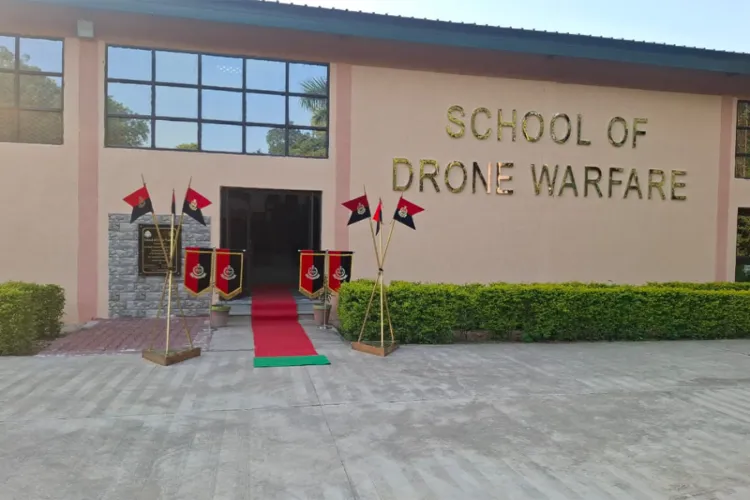
Tekanpur
In response to changing threats along India's borders after Operation Sindoor, the Border Security Force (BSF) has established the country's first dedicated drone warfare school at its training academy in Madhya Pradesh's Tekanpur to build offensive and defensive unmanned aerial capabilities.
Established last month, the inaugural batch, comprising 40 officers, underwent a week-long "drone orientation" course that included Commandant and Second-in-Command level officials drawn from all BSF frontiers and Subsidiary Training Centres (STCs). At present, a second group of 47 personnel is enrolled in the intensive six-week "drone commando course", which includes trainees from the ranks of Subordinate Officers, Assistant Sub-Inspectors, and Constables.
Drone piloting, tactics, Research and Development (R&D) and following rising drone-enabled smuggling and threat tactics will be taught to these personnel at the school-- the brainchild of the ADG and Director of BSF Academy, Tekanpur.
Additional Director General (ADG) and Director of BSF Academy, Tekanpur, Shamsher Singh, told ANI that the force has faced drone-enabled narcotics and weapons smuggling on the border for the past four to five years, and that those challenges have taken new forms after Operation Sindoor.
"To face these challenges effectively, to train our manpower and equip our force so that they can meet these challenges, we have established the School of Drone Warfare last month," ADG said.
"The school -- which has already graduated one batch and is currently training a second -- is organised into three wings: Flying and Piloting, Tactics, and Research and Development. The tactics wing is the primary focus: it integrates offensive and defensive operations and trains officers and soldiers together to operate in combined roles," the officer explained.
The ADG said, "Two flagship courses have been introduced in the drone warfare school - Drone Commando and Drone Warrior courses".
"The Drone Commando course is targeted at personnel who will operate drones on the border, covering flying, repairs, weaponisation and rapid assembly. The commando can strip a rifle within 50 seconds. We want to train our commando in such a way that he can assemble a drone in 50 seconds", he added.
The BSF officer said the "curriculum was designed after a comprehensive analysis of five years of border incidents, including forensic study of the technologies used by smugglers and hostile actors."
"We have analysed all the information that has happened on the border in the last five years. We have forensic details. We analysed the technology and designed our training courses on the basis of our experience on the border," ADG Shamsher further said.
He added, "The courses include modules on defending against drone attacks, neutralising rogue or enemy drones, and integrating drone patrols into broader border-management operations."
The officer indicated that the BSF envisions future deployment of drone patrolling along sensitive stretches of the frontier.
He also emphasised the broader strategic shift in security training, saying, "Border situation will be changed. BSF is ready to adopt such technology and courses, and training schedules, like preparation to deal with cyber war."
The new school, the ADG added, aligns with efforts to indigenise capabilities and create a technology-ready border force capable of countering hybrid and asymmetric threats.
ADG further stated that the school runs the flagship Drone Commando and Drone Warrior courses to prepare forces for both offensive and defensive drone operations, including rapid drone assembly and counter-drone measures.
BSF Inspector General Umed Singh told ANI that drone warfare is an emerging domain demonstrated extensively in the Russia-Ukraine conflict.
"After Operation Sindoor, we faced similar heavy drone usage from across the western border. As a first line of defence, it is essential that our forces are trained and equipped in drone operations and counter-drone tactics. Counter-drone capability is complex and includes spoofers, jammers, detectors and both soft-kill and hard-kill solutions. We are working to establish an integrated counter-drone system tailored to field formations and are prioritising the provision of these systems to our units. Training on these technologies is already underway", said Inspector General Singh.
Brigadier Rupinder Singh Instructor, BSF Academy Tekanpur, told ANI that the force observed large-scale use of military-grade drones during Operation Sindoor and based on that experience, "we set up this School of Drone Warfare to train BSF officers and personnel in both drone operations and counter-drone measures."
"The course teaches practical flying skills, tactical employment in operational scenarios, and the technical details of drones and anti-drone systems," said Brigadier Rupinder.
"We also give trainees case studies from recent conflicts -- how the US, Israel, China and others have used drones, and the evolving role of drones in the Russia-Ukraine war. Over the six-week programme, participants learn to operate and maintain equipment. The technology is changing the nature of combat and, as seen in Operation Sindoor and other conflicts, requires us to adapt our tactics", Brigadier Singh added.
"Previously, commanders planned for direct-fire threats such as small arms or tank fire; now even trenches offer limited protection because drones can operate overhead. To meet this shift, we are updating tactics as well as technical training", he stated.
Brigadier Singh further said that the BSF has also procured jammers and radar trainers and is seeking additional systems for a comprehensive training setup -- the procurement programme is estimated at around Rs 20 crore.
Manoj Painuli, Second-in-Command and Specialist Drone Instructor in BSF's Tekanpur unit, said, "This practical exercise is part of the BSF's drone training at the Gwalior academy, covering all ranks from decision-makers to frontline personnel. We have tailored courses for different levels."
READ MORE: Artist-Poet G. R. Santosh was inspired by Kashmir's Shaivism, Tantra
"Today's exercise, 'Drone Vajra', simulates conditions similar to Jammu and Punjab borders using tethered and conventional drones. Trainees conduct field exercises to experience ground conditions, plan missions and understand environmental factors that affect flight and ISR -- electromagnetic interference, wind, sun-angle and other variables -- all of which influence surveillance and reconnaissance outcomes", said Painuli.
